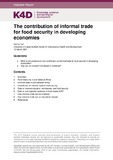| dc.contributor.author | Tull, Kerina | |
| dc.coverage.spatial | Sub-Saharan Africa | en |
| dc.date.accessioned | 2021-04-15T12:00:16Z | |
| dc.date.available | 2021-04-15T12:00:16Z | |
| dc.date.issued | 2021-03-12 | |
| dc.identifier.uri | https://opendocs.ids.ac.uk/opendocs/handle/20.500.12413/16542 | |
| dc.description.abstract | This rapid review will provide additional understanding on the importance of informal trade in food security. Additional data on regional food movement in sub-Saharan Africa, and remittance trends is explored by request. Specific country case studies are also presented. Key points to highlight include the negative connotation of Informal cross-border trade/ICBT, as ‘informal’ can be easily confused with ‘illegal’ and this term also inaccurately reflects the reality of trade flows on the ground. Although the types of goods carried by informal cross-border traders varies widely, the trade in sub-Saharan Africa is dominated by food, especially small-scale groceries and fresh produce. There is considerable data valuing food security in Sub-Saharan Africa, however, it is not always current. For some regions, data on the scale of ICBT’s contribution to food security and food movement (trade, remittances, in-kind, etc.) is limited and based on estimates. Evidence for this rapid review was mostly taken from grey literature, including working papers and policy briefs. Data on the contribution of informal trade for food security was obtained from informal regional economy reports (e.g. Economic Community Of West African States, ECOWAS; Common Market for Eastern and Southern Africa, COMESA), as well as research projects such as the Southern African Consuming Urban Poverty (CUP) project. Estimates of informal food trade e.g. from USAID’s Famine Early Warning Systems Network (FEWS NET), were used when data was unavailable. | en |
| dc.description.sponsorship | FCDO (Foreign, Commonwealth and Development Office) | en |
| dc.language.iso | en | en |
| dc.publisher | Institute of Development Studies | en |
| dc.relation.ispartofseries | K4D Helpdesk Report;983 | |
| dc.rights.uri | https://www.nationalarchives.gov.uk/doc/open-government-licence/version/3/ | en |
| dc.subject | Development Policy | en |
| dc.subject | Rights | en |
| dc.subject | Trade | en |
| dc.title | The Contribution of Informal Trade for Food Security in Developing Economies | en |
| dc.type | Helpdesk | en |
| dc.rights.holder | © Crown copyright 2021 | en |
| dc.identifier.doi | 10.19088/K4D.2021.050 | |
| dcterms.dateAccepted | 2021-03-12 | |
| rioxxterms.funder | Default funder | en |
| rioxxterms.identifier.project | Default project | en |
| rioxxterms.version | VoR | en |
| rioxxterms.versionofrecord | 10.19088/K4D.2021.050 | en |
| rioxxterms.funder.project | 9ce4e4dc-26e9-4d78-96e9-15e4dcac0642 | en |

